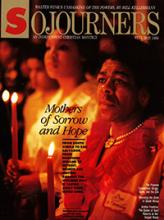RICHARD STEELE AND ANITA KROMBERG work in South Africa for the International Fellowship of Reconciliation and direct much of their time and energy into the End Conscription Campaign (ECC). Steele spent one year in military detention in 1980 as a conscientious objector. Steele and Kromberg speak here as activists intimately involved with the ECC, but not as formal representatives of it. -- The Editors
Read the Full Article

Already a subscriber? Login
